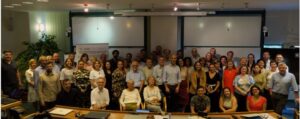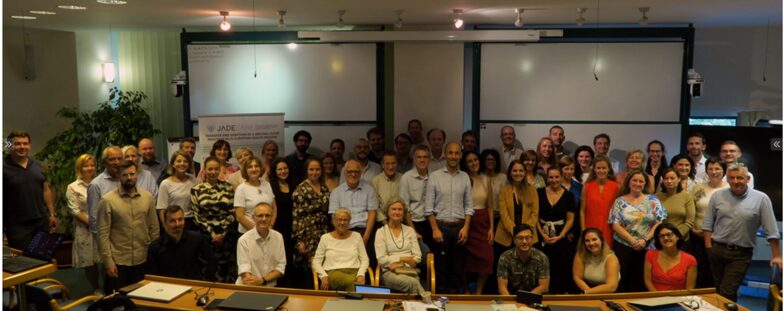JADECARE 3rd and final Consortium meeting was held on 27 September 2023 in Budapest (Hungary) in a hybrid format and with the participation of more than 60 people. The event served to ensure that the project was properly developed as far as the third year of the Joint Action, to foster knowledge exchange on Local Good Practices implementation among JADECARE partner and also to finally close the project and summarize the achievements of the three years of the Joint Action.
The final project meeting also served to organize the last JADECARE Stakeholder Forum. This forum aimed to facilitate the exchange of experiences and the creation of knowledge networks between JADECARE participating organizations and relevant stakeholders.
Over the three years of the project, various meetings have been organized with external stakeholders including representatives from health systems, researchers, and academia interested in collaborating with the JA to discuss the status and achievements of JADECARE, emerging issues, as well as other ideas, solutions, and networking possibilities about further supporting digitally enabled integrated person-centred care in Europe. The forums have also involved leading healthcare industries to contribute to the improvement of competitiveness and economic growth opportunities for the EU industry.
The main theme of the last forum organized in Budapest was “Person-centred and digitally enabled integrated care – Sustainability of implementations”. The objectives of this meeting were initially to present the experiences, learnings, and achievements of JADECARE and share the sustainability plans of some Next Adopters to maintain and further develop their local good practices. Fort his means four organizations presented their experiences, learnings, and sustainability actions and plans developed in the framework of the project: Agenzia Regionale Sanitaria Tuscany (ARS Toscana, Italy), Semmelweis University Health Services Management Training Centre (SU-HSMTC, Hungary) Dienststelle Selbstbestimmtes Leben, (DSL, Belgium) and Salud de Castilla y León (SACYL, Spain).
In the second part of the meeting, the objectives were to discuss (i) stakeholder involvement and the need to make digital solutions that support integrated patient-centered care pathways sustainable, in order to become an everyday reality in their systems and (ii) also the challenges and new developments in Europe for value-integrated health and social care services and how they can be supported by digital solutions.
Prof. Miklós Szócska, Dean of the Health Service Faculty at Semmelweis University and Director of the Healthcare Service Management Training Centre (SU-HSMTC) in Budapest, welcomed everybody to this important Forum on innovative and new ways of care for patients that JADECARE represented with its use cases, best practices and approaches. After that, a stimulating key note on “Pressure points and solutions for person-centred integrated care supported by digital tools and pathways ” by Donna Henderson from Technology Enabled Care, TEC, Scotland, highlighted the need to change the current model of medical care in order to face the challenges due to growing chronic diseases and demographic change to provide successful medical health and care services. She recommended to manage demands and capacity challenges, to contain costs by improving management of physical and mental diseases, to move to prevention, anticipation and prediction of risk, to relieve pressure on and support staff, caregivers and families, and to find novel ways of creating additional capacity within the system – all supported efficiently by digital technology and tools.
After the presentation of the results and experience, learnings and sustainability actions and plans of the four selected Next Adopters, in the second part of the Stakeholder Forum seven renowned experts in the field of integrated and digital health and care discussed the topics of the objectives of the meeting with the onsite and online audience of around 80 participants.
- Miklós Szócska (SU-HSMTC, Hungary)
- Marc Lange (European Health Telematics Association, EHTEL, EU)
- Sergio González, (European Institute of Innovation and Technology, EIT Health, Spain)
- Donna Henderson (TEC Scotland)
- Ewout van Ginneken (European Observatory on Health Systems and Policies, Berlin)
- Albert Alonso (Intl. Foundation for Integrated Care, ICIC)
- Jan Pfeiffer (European Expert Group on Transition of institutional to community-based care)
The experts touched upon different aspects of challenges and chances to enhance person-centred integrated care, granting valuable pieces of advice. They made a distinct point that Digital Health has to be developed into a “Systems capability“ rather than a one-time development of digital solutions of certain groups of developers. They acknowledged the achievements of JADECARE and recommended leading the experiences learned into a permanent “JADECARE clearing house” that supports the digital systems capability transformation of health systems throughout Europe.
On a political scale the experts drew the attention of the audience to the Digital Health Uptake (DHU) project including the DHU radar tool for the analysis and monitoring of the potential for technological innovation and uptake of digital health solutions in Europe (Digital Europe Programme). The aim of the DHU project is to facilitate the alignment of policies, strategies, instruments and activities to advance the uptake of digital health solutions and services in Europe. As a hands-on project example from the health care industry innovators and adopters’ side, the audience enjoyed the introduction of F3T, the Framework for Fast Fast-Track of Digital Health Solutions, to streamline and fasten the adoption of digital health applications in Spain in an aligned manner.
The experts recognized that the achievements of JADECARE can ensure a positive impact on digital health service tools users (e.g. improvements in their health outcomes and improved satisfaction with services), on professionals involved in delivering the services, as well as on service providers (e.g. reduced expenditure and hospital readmissions). An as simple as possible, combined and for all stakeholders equally accessible approach is necessary though in order to successfully improve quality, performance and safety in health and social care for people living with chronic and complex conditions. At the same time all present Stakeholders were encouraged to ensure that people living with chronic and complex conditions receive the necessary care in line with their particular needs and preferences.

